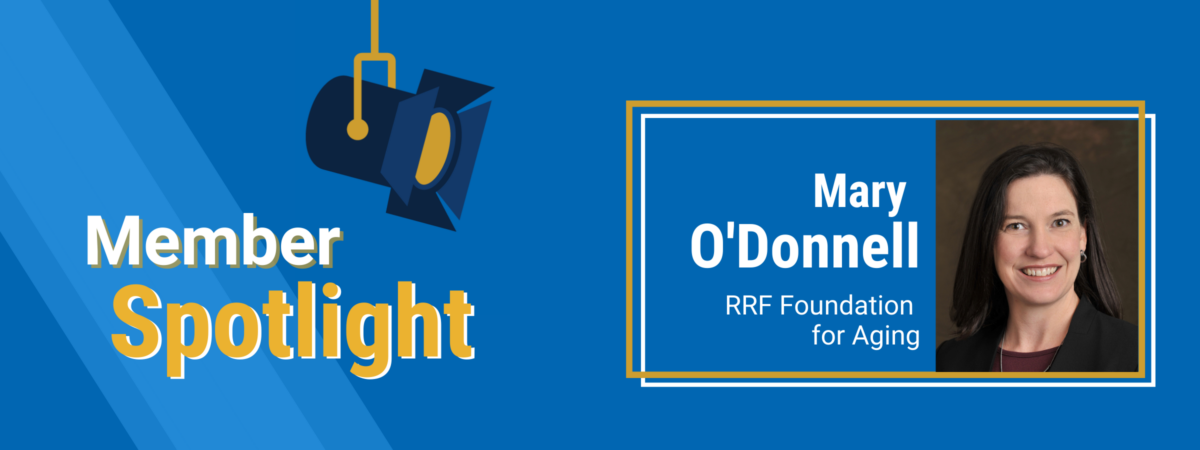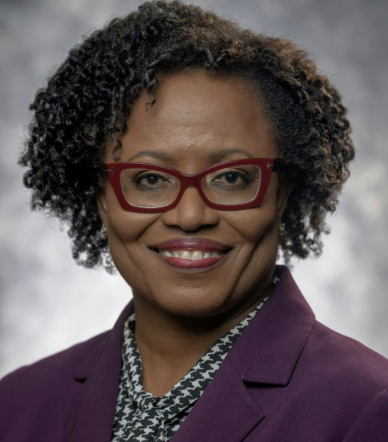 Meet our members! AFN’s greatest asset is our members—a diverse network of national, regional, and community-based foundations, financial institutions, and grantmakers—investing in advancing equitable wealth building and economic mobility. Check back each month and meet your peers!
Meet our members! AFN’s greatest asset is our members—a diverse network of national, regional, and community-based foundations, financial institutions, and grantmakers—investing in advancing equitable wealth building and economic mobility. Check back each month and meet your peers!
1: What is the mission of your organization and how is advancing equitable wealth building and economic mobility incorporated into the work?
For more than 40 years, RRF Foundation for Aging (RRF), formerly known as The Retirement Research Foundation, has been dedicated to improving the quality of life of older people.
Within our priority area of Economic Security in Later Life, we appreciate the intersectionality of race, ethnicity, and gender in considering equitable wealth building and economic mobility for older people. We recognize that reaching economic justice may require different approaches for older people than for younger generations. We welcome opportunities to explore these issues through AFN’s Network.
RRF’s grantmaking supports economic well-being of older adults in several ways, including: building their financial knowledge and skills to manage income and savings effectively, address debt, and avoid financial exploitation; and advocating for a stable, equitable public and private system of economic supports, services, and protections.
RRF was an early supporter of the creation of the initial blueprints, and then implementation of, state-facilitated, employer-based retirement savings programs. As a result, Illinois was one of the first states to create such a savings program – Illinois Secure Choice – for employees who previously had no option at their workplace to save for retirement.
Recently, RRF awarded a grant to The New School/Retirement Equity Lab, in partnership with the Economic Policy Institute, to produce The Older Workers and Retirement Chartbook. This comprehensive, easily accessible online tool will document disparities in retirement preparedness and the link between older workers’ status and retirement insecurity. This grant illustrates the type of “action research” in which RRF is interested and the partnerships RRF encourages. It pairs a pre-eminent researcher with a leader of a network of diverse advocates to reach beyond the groups typically involved in aging issues.
For more about the challenges and opportunities surrounding economic security in later life and RRF Foundation for Aging’s funding in this area, please see this Issue Brief.
2: What are some of the permanent pivots you have made as a result of the COVID-19 pandemic and the current moment emphasizing the critical need for strategies that provide a range of support to women and Black, Latinx, Indigenous and Asian people and communities?
At the start of the pandemic, RRF immediately provided more than $1M to nonprofit organizations on the front lines. We collaborated with a broad array of funders through joint COVID-19 relief efforts. This resulted in ongoing partnerships with funders outside of the field of aging and opportunities to find common ground on many issues.
We also engaged with grantees, immediately enabling them to convert existing grant funds to general operating support. This adjustment led to RRF incorporating general operating grants into its grantmaking approach more systematically. Recently, RRF awarded a set of multi-year general operating grants to strong advocacy organizations that promote economic justice for older people.
Current pandemic and societal challenges have led to a more intentional focus on the needs of older women, and Black, Latinx, Indigenous, and Asian older people and has galvanized our commitment to Diversity, Equity, and Inclusion (DEI). RRF acknowledges that long-standing, structural inequities in our society have led to disparities within the older adult population, as well as unequal opportunities for accessing essential resources that enable quality of life as one ages. We are putting structures in place to bring an equity-focused and race-conscious lens to all aspects of the Foundation and its work.
s
3: What are some of the most significant gaps that you have identified that could help address economic equity?
The importance of debt as a significant threat to economic well-being needs greater attention. During the past two decades, both the percentage of older people carrying debt and the amount of debt they carry has increased by 50%. Excessive credit card, medical, and student loan debt has a significant impact on the economic security of all generations. But, we know that older people disproportionately hold credit card debt and are more often victims of fraud and predatory lending practices.
Gender and economic equality is another important area for strategic investment. Women aged 65+ are twice as likely as men to face poverty in old age. This disparity is even more significant for older Latinas and African American women. Divorced older women on average experience a 41% decline in their income and assets. Many older women do not receive a share of an ex-spouse’s pension because they are unaware that they have a right to it, or don’t know how to access it.
s
4: Thinking about your previous answer, what do you see as the biggest barriers or challenges for philanthropy to address these gaps?
Philanthropy tends to respond to short-term opportunities (and we are no exception), but addressing systemic barriers to economic justice requires a commitment to long-term policy solutions. Therefore, we encourage philanthropy to invest in advocacy — and help provide advocates with the data and other tools needed — over the long term. RRF is one of only a handful of funders in the field of aging that will support advocacy. We are looking to partner with other AFN members of like spirit.
s
5: What have been some of the biggest benefits of being part of the Asset Funders Network?
As a relative newcomer to the Asset Funders Network, we look forward to the opportunities the Network provides to find common ground along mutual interests.
6: Is there a question you would like to raise to your funder colleagues?
We welcome AFN members’ response to the question: How do you see the economic justice issues of older people intersecting with the work in which you are investing, and how can we work together effectively?
7: Are there any useful resources you would like to share with your funder colleagues?
We invite other funders to join us in conversation about common interests. One of the ways we engage and support a growing like-minded community is through the Knowledge Center on RRF Foundation for Aging’s website, which can be found here. It contains a number of useful resources related to Economic Security in Later Life, including this Issue Brief.
8: What is the last book you read?
I am writing this post during a snowy afternoon in February 2022 on the heels of the pandemic’s Omicron surge. I just finished reading Wintering: The Power of Rest in Difficult Times, by Katherine May. It was just what I needed this season, both as a foundation leader and a human being. It encourages us to be gentle with ourselves and to understand that life is cyclical, not linear. And it encourages us to recognize that difficult times—when properly embraced and reflected upon—can offer unique moments of opportunity and revitalization.
About Mary O’Donnell, President, RRF Foundation for Aging
RRF Foundation for Aging is a national grantmaking organization devoted to improving the quality of life of older people.
Mary is responsible for managing all Foundation operations, the distribution of over $7.5 million to grantee partners, and implementation of a strategic plan that calls for increasingly targeted and proactive grantmaking, funder collaboration, and knowledge sharing.

